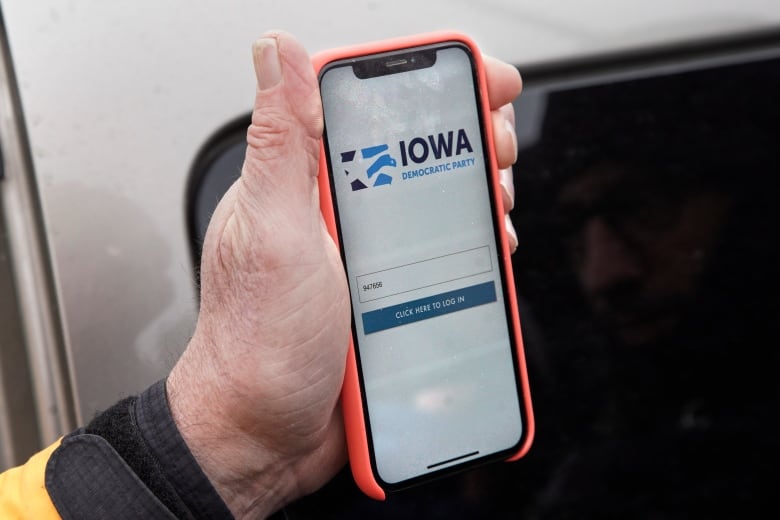AP unable to declare winner in Iowa caucuses due to irregularities
Evidence Iowa Democratic Party has not accurately tabulated some results, says Associated Press

The Associated Press said Thursday that it is unable to declare a winner of Iowa's Democratic caucuses.
Following the Iowa Democratic Party's release of new results late Thursday night, former South Bend, Ind., mayor Pete Buttigieg leads Vermont Sen. Bernie Sanders by two state delegate equivalents out of 2,152 counted. That is a margin of 0.09 percentage points.
However, there is evidence the party has not accurately tabulated some of its results, including those released late Thursday that the party reported as complete.
Further, even as the Iowa Democratic Party's effort to complete its tabulation of the caucus results continued Thursday, Democratic National Committee Chairman Tom Perez asked the Iowa Democratic Party to conduct a recanvass. That is not a recount, but rather a check of the vote count to ensure the results were added correctly.
Perez sought the recanvass following days of uncertainty about the results reported by the Iowa Democratic Party, which includes technology problems with the mobile phone app used by the party to collect results from caucus sites, an overwhelming number of calls to the party's backup phone system and a subsequent delay of several days of reporting the results.

The Iowa Democratic Party suggested it may not comply with Perez's request, issuing a statement that said it would conduct a recanvass if one was requested by one of the candidates.
"The Associated Press calls a race when there is a clear indication of a winner. Because of a tight margin between former Mayor Pete Buttigieg and Sen. Bernie Sanders and the irregularities in this year's caucus process, it is not possible to determine a winner at this point," said Sally Buzbee, AP's senior vice president and executive editor.
The AP will continue to monitor the race, as well as the results of any potential recanvass or recount.
The caucus crisis was an embarrassing twist after months of promoting Iowa as a chance for Democrats to find some clarity in a jumbled 2020 field. Instead, after a buildup that featured seven rounds of debates, nearly $1 billion US spent nationwide and a year of political jockeying, caucus day ended with no winner and no official results.
Campaigning in New Hampshire, Sanders called the Iowa Democratic Party's management of the caucuses a "screw-up" that has been "extremely unfair" to the candidates and their supporters.
"We've got enough of Iowa," he said later Thursday at a CNN town hall. "I think we should move onto New Hampshire."
Lengthy delay in Republican contest in 2012
Iowa marked the first contest in a primary season that will span all 50 states and several U.S. territories, ending at the party's national convention in July.
The confusion is not unprecedented. While the 2016 contests in Iowa were decided in quick fashion, in 2012 it took 18 days before it officially emerged that Rick Santorum had come out ahead of Mitt Romney in the Republican race.
As first reported by The New York Times, numerous precincts this week reported results that contained errors or were inconsistent with party rules. For example, the AP confirmed that dozens of precincts reported more final alignment votes than first alignment votes, which is not possible under party rules. In other precincts, viable candidates lost votes from the first alignment tally to the final, which is also inconsistent with party rules.
Some precincts made apparent errors in awarding state delegate equivalents to candidates. A handful of precincts awarded more state delegate equivalents than they had available. A few others didn't award all of theirs.
The trouble began with an app that the Iowa Democratic Party used to tabulate the results of the contest. The app was rolled out shortly before caucusing began and did not go through rigorous testing.

The problems were compounded when phone lines for reporting the outcomes became jammed, with many callers placed on hold for hours in order to report outcomes. Party officials said the backlog was exacerbated by calls from people around the country who accessed the number and appeared intent on disrupting the process.
Buttigieg and Sanders will emerge from Iowa's caucuses with the most delegates to the party's national convention, regardless of which one eventually wins the contest. They have each won at least 11 national delegates, with a handful of delegates still to be awarded, according to the AP delegate count. Massachusetts Sen. Elizabeth Warren has won at least five delegates, while former vice-president Joe Biden has won at least two and Minnesota Sen. Amy Klobuchar has at least one.
7 candidates ready for debate
Iowa will award 41 pledged delegates to the Democratic National Convention this summer. There are 11 delegates still to be awarded as the state party sorts out the final results of the caucuses.
Candidates must win a majority of pledged delegates to the party's national convention to win the Democratic nomination for president on the first ballot. This year, that's 1,191 pledged delegates.
But the breakdown seems sure to blunt the impact of Iowa's election, which typically rewards winners with a surge of momentum heading into subsequent primary contests. It is likely a welcome development for Michael Bloomberg, the billionaire former mayor of New York City who has opted to concentrate on states being contested in March, when a significant number of the delegates will be decided.
The other Democrats have quickly turned their focus to New Hampshire, which holds the next voting contest on Tuesday.
Seven candidates will participate in a debate tonight in Manchester, N.H.:
- Joe Biden.
- Pete Buttigieg.
- Amy Klobuchar.
- Bernie Sanders.
- Tom Steyer.
- Elizabeth Warren.
- Andrew Yang.
With files from CBC News